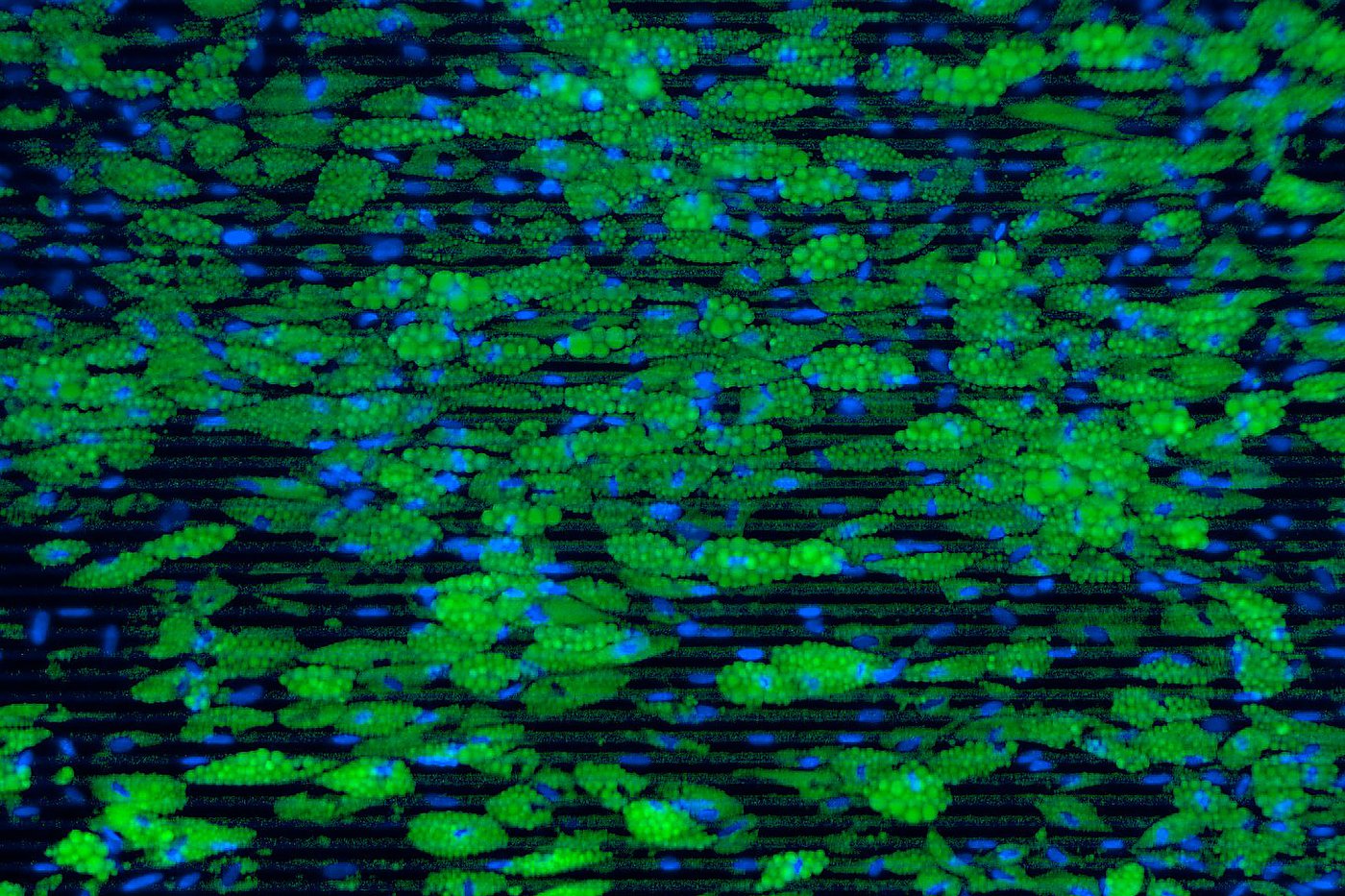
Colony of human induced pluripotent stem cells - Expression of pluripotency markers at the cell surface (red) and in the nucleus (green, additionally stained with DAPI, blue) [Copyright: Institute for Biomedical Engineering – Cell Biology, UK Aachen]
The Stem Cell Network North Rhine-Westphalia has existed since 2002 and is comprised not only of biomedical institutes and clinics but also ethical, legal, and social science institutions.This composition reflects the transdisciplinary approach of the network: In addition to promoting biomedical stem cell research in North Rhine-Westphalia (NRW), ethical, legal, and social science studies are intended to ensure a responsible approach to the topic, especially in view of the high expectations placed on this research area in the future. A total of almost 80 institutions in NRW form the network, at 23 different institutions.
Years
Since 20 years established in North Rhine-Westphalia
Institutions
23 member institutions
Sites
12 sites in North Rhine-Westphalia
Institutes
89 institutes from biomedicine, philosophy, legal and social sciences
Stem cell research will answer many exciting scientific questions in the future. Above all, however, it can help to overcome major societal challenges, such as by researching into degenerative diseases. To achieve this, stem cell researchers from different scientific disciplines must work together and exchange their knowledge. The numerous universities in North Rhine-Westphalia offer excellent conditions for this. In this context, the promotion of early career researchers and career development for women in science are also of great importance for the network.
The Stem Cell Network NRW, therefore, brings together leading scientists from medicine and biology, philosophy and social sciences, law, and theology in order to shape stem cell research responsibly and transparently, and, at the same time, make developments in this field accessible to society.
Both biomedical basic research and the transfer of research results into practical applications are addressed in the Stem Cell Network NRW. At the same time, philosophers, jurists, and social scientists in the network provide important impulses for discussing the benefits and risks of research projects. The aim is to overcome scientific, ethical, and legal obstacles.
The Stem Cell Network started its work in 2002 financed by the then Ministry of Science (now Ministry of Culture and Science of the State of NRW (MKW)). The close link between biomedical research and ethical, legal, and social aspects has been a central characteristic of the network since the beginning. Only in this way is asocial dialogue about the benefits and risks of biomedical research and its applications possible.
The network has since gained great national and international standing. Numerous regional, national, and international projects take place within its framework, closely linked to interdisciplinary accompanying research and the targeted promotion of young talents in science.
In view of the Stem Cell Network’s ongoing success story since 2002, the MKW has promised to provide long-term support for the network. This began on January 1, 2019, and was accompanied by the network’s name change from “Kompetenznetzwerk Stammzellforschung NRW” into “Stammzellnetzwerk.NRW” (only applied to the German name, the English name remained “Stem Cell Network North Rhine-Westphalia”).
The network’s locations can be found throughout North Rhine-Westphalia, in Aachen, Bielefeld, Bochum, Bonn, Cologne, Dortmund, Düsseldorf, Duisburg, Essen, Hamm, Münster, and Witten/Herdecke. In terms of content, it also covers the full breadth of stem cell research.
Since social dialogue is of great importance, the network’s Advisory Board includes representatives from the fields of politics and regulation, science and hospitals, business, patient organizations, and religion and belief.
The Stem Cell Network NRW is regarded as a model for the state of North Rhine-Westphalia’s concept to bundle state-wide activities in the field of stem cell research, to promote young talents, and to successfully position North Rhine-Westphalia as a research location in international competition.
Research Groups
9 funded Junior Research Groups (in cooperation with the science ministry in NRW)
More than
Projects
More than 50 seed fund projects (in cooperation with the science ministry in NRW)
Participants
Already 20 (inter-)national conferences since 2002 with approximately 7000 participants in total
Scientists
328 scientists from NRW are involved